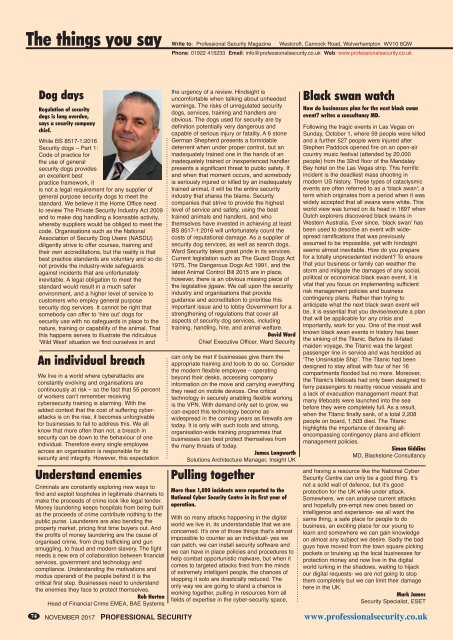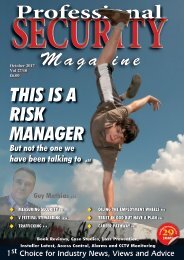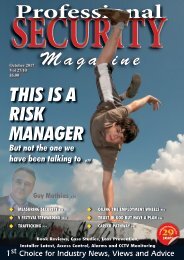27-11draft
You also want an ePaper? Increase the reach of your titles
YUMPU automatically turns print PDFs into web optimized ePapers that Google loves.
The things you say Write to: Professional Security Magazine<br />
Westcroft, Cannock Road, Wolverhampton WV10 8QW<br />
Phone: 01922 415233 Email: info@professionalsecurity.co.uk Web: www.professionalsecurity.co.uk<br />
74<br />
Dog days<br />
Regulation of security<br />
dogs is long overdue,<br />
says a security company<br />
chief.<br />
While BS 8517-1:2016<br />
Security dogs – Part 1:<br />
Code of practice for<br />
the use of general<br />
security dogs provides<br />
an excellent best<br />
practice framework, it<br />
is not a legal requirement for any supplier of<br />
general purpose security dogs to meet the<br />
standard. We believe it the Home Office need<br />
to review The Private Security Industry Act 2009<br />
and to make dog handling a licensable activity,<br />
whereby suppliers would be obliged to meet the<br />
code. Organisations such as the National<br />
Association of Security Dog Users (NASDU)<br />
diligently strive to offer courses, training and<br />
their own accreditations, but the reality is that<br />
best practice standards are voluntary and so do<br />
not provide the industry-wide safeguards<br />
against incidents that are unfortunately<br />
inevitable. A legal obligation to meet the<br />
standard would result in a much safer<br />
environment, and a higher level of service to<br />
customers who employ general purpose<br />
security dog services. It cannot be right that<br />
somebody can offer to ‘hire out’ dogs for<br />
security use with no safeguards in place to the<br />
nature, training or capability of the animal. That<br />
this happens serves to illustrate the ridiculous<br />
‘Wild West’ situation we find ourselves in and<br />
An individual breach<br />
We live in a world where cyberattacks are<br />
constantly evolving and organisations are<br />
continuously at risk – so the fact that 55 percent<br />
of workers can’t remember receiving<br />
cybersecurity training is alarming. With the<br />
added context that the cost of suffering cyberattacks<br />
is on the rise, it becomes unforgivable<br />
for businesses to fail to address this. We all<br />
know that more often than not, a breach in<br />
security can be down to the behaviour of one<br />
individual. Therefore every single employee<br />
across an organisation is responsible for its<br />
security and integrity. However, this expectation<br />
Understand enemies<br />
Criminals are constantly exploring new ways to<br />
find and exploit loopholes in legitimate channels to<br />
make the proceeds of crime look like legal tender.<br />
Money laundering keeps hospitals from being built<br />
as the proceeds of crime contribute nothing to the<br />
public purse. Launderers are also bending the<br />
property market, pricing first time buyers out. And<br />
the profits of money laundering are the cause of<br />
organised crime, from drug trafficking and gun<br />
smuggling, to fraud and modern slavery. The fight<br />
needs a new era of collaboration between financial<br />
services, government and technology and<br />
compliance. Understanding the motivations and<br />
modus operandi of the people behind it is the<br />
critical first step. Businesses need to understand<br />
the enemies they face to protect themselves.<br />
Rob Horton<br />
Head of Financial Crime EMEA, BAE Systems<br />
NOVEMBER 2017 PROFESSIONAL SECURITY<br />
the urgency of a review. Hindsight is<br />
uncomfortable when talking about unheeded<br />
warnings. The risks of unregulated security<br />
dogs, services, training and handlers are<br />
obvious. The dogs used for security are by<br />
definition potentially very dangerous and<br />
capable of serious injury or fatality. A 6 stone<br />
German Shepherd presents a formidable<br />
deterrent when under proper control, but an<br />
inadequately trained one in the hands of an<br />
inadequately trained or inexperienced handler<br />
presents a significant threat to public safety. If<br />
and when that moment occurs, and somebody<br />
is seriously injured or killed by an inadequately<br />
trained animal, it will be the entire security<br />
industry that shares the blame. Security<br />
companies that strive to provide the highest<br />
level of service and safety, using the best<br />
trained animals and handlers, and who<br />
themselves have invested in achieving at least<br />
BS 8517-1:2016 will unfortunately count the<br />
costs of reputational damage. As a supplier of<br />
security dog services, as well as search dogs,<br />
Ward Security takes great pride in its services.<br />
Current legislation such as The Guard Dogs Act<br />
1975, The Dangerous Dogs Act 1991, and the<br />
latest Animal Control Bill 2015 are in place,<br />
however, there is an obvious missing piece of<br />
the legislative jigsaw. We call upon the security<br />
industry and organisations that provide<br />
guidance and accreditation to prioritise this<br />
important issue and to lobby Government for a<br />
strengthening of regulations that cover all<br />
aspects of security dog services, including<br />
training, handling, hire, and animal welfare.<br />
David Ward<br />
Chief Executive Officer, Ward Security<br />
can only be met if businesses give them the<br />
appropriate training and tools to do so. Consider<br />
the modern flexible employee – operating<br />
beyond their desks, accessing company<br />
information on the move and carrying everything<br />
they need on mobile devices. One critical<br />
technology in securely enabling flexible working<br />
is the VPN. With demand only set to grow, we<br />
can expect this technology become as<br />
widespread in the coming years as firewalls are<br />
today. It is only with such tools and strong,<br />
organisation-wide training programmes that<br />
businesses can best protect themselves from<br />
the many threats of today.<br />
James Longworth<br />
Solutions Architecture Manager, Insight UK<br />
Pulling together<br />
More than 1,000 incidents were reported to the<br />
National Cyber Security Centre in its first year of<br />
operation.<br />
With so many attacks happening in the digital<br />
world we live in, its understandable that we are<br />
concerned. It’s one of those things that’s almost<br />
impossible to counter as an individual- yes we<br />
can patch, we can install security software and<br />
we can have in place policies and procedures to<br />
help combat opportunistic malware, but when it<br />
comes to targeted attacks fired from the minds<br />
of extremely intelligent people, the chances of<br />
stopping it solo are drastically reduced. The<br />
only way we are going to stand a chance is<br />
working together, pulling in resources from all<br />
fields of expertise in the cyber-security space,<br />
Black swan watch<br />
How do businesses plan for the next black swan<br />
event? writes a consultancy MD.<br />
Following the tragic events in Las Vegas on<br />
Sunday, October 1, where 59 people were killed<br />
and a further 5<strong>27</strong> people were injured after<br />
Stephen Paddock opened fire on an open-air<br />
country music festival (attended by 20,000<br />
people) from the 32nd floor of the Mandalay<br />
Bay hotel on the Las Vegas strip. This horrific<br />
incident is the deadliest mass shooting in<br />
modern US history. These types of cataclysmic<br />
events are often referred to as a ‘black swan’; a<br />
term which originates from a period when it was<br />
widely accepted that all swans were white. This<br />
world view was turned on its head in 1697 when<br />
Dutch explorers discovered black swans in<br />
Western Australia. Ever since, ‘black swan’ has<br />
been used to describe an event with widespread<br />
ramifications that was previously<br />
assumed to be impossible, yet with hindsight<br />
seems almost inevitable. How do you prepare<br />
for a totally unprecedented incident? To ensure<br />
that your business or family can weather the<br />
storm and mitigate the damages of any social,<br />
political or economical black swan event, it is<br />
vital that you focus on implementing sufficient<br />
risk management policies and business<br />
contingency plans. Rather than trying to<br />
anticipate what the next black swan event will<br />
be, it is essential that you devise/execute a plan<br />
that will be applicable for any crisis and<br />
importantly, work for you. One of the most well<br />
known black swan events in history has been<br />
the sinking of the Titanic. Before its ill-fated<br />
maiden voyage, the Titanic was the largest<br />
passenger line in service and was heralded as<br />
‘The Unsinkable Ship’. The Titanic had been<br />
designed to stay afloat with four of her 16<br />
compartments flooded but no more. Moreover,<br />
the Titanic’s lifeboats had only been designed to<br />
ferry passengers to nearby rescue vessels and<br />
a lack of evacuation management meant that<br />
many lifeboats were launched into the sea<br />
before they were completely full. As a result,<br />
when the Titanic finally sank, of a total 2,208<br />
people on board, 1,503 died. The Titanic<br />
highlights the importance of devising allencompassing<br />
contingency plans and efficient<br />
management policies.<br />
Simon Giddins<br />
MD, Blackstone Consultancy<br />
and having a resource like the National Cyber<br />
Security Centre can only be a good thing. It’s<br />
not a solid wall of defence, but it’s good<br />
protection for the UK while under attack.<br />
Somewhere, we can analyse current attacks<br />
and hopefully pre-empt new ones based on<br />
intelligence and experience- we all want the<br />
same thing, a safe place for people to do<br />
business, an exciting place for our young to<br />
learn and somewhere we can gain knowledge<br />
on almost any subject we desire. Sadly the bad<br />
guys have moved from the town square picking<br />
pockets or bruising up the local businesses for<br />
protection money and now live in the digital<br />
world lurking in the shadows, waiting to hijack<br />
our digital requests- we are not going to stop<br />
them completely but we can limit their damage<br />
here in the UK.<br />
Mark James<br />
Security Specialist, ESET<br />
www.professionalsecurity.co.uk<br />
p74 Letters <strong>27</strong>-11.indd 1 11/10/2017 15:05










